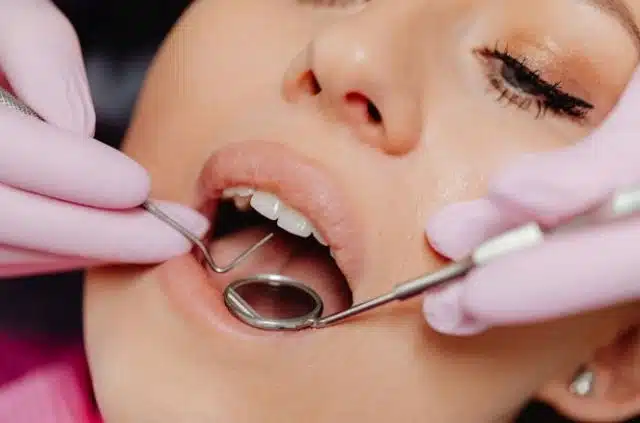Choosing the right dentist can feel like navigating a maze. You know dental care is crucial for your health, but how do you find the best dental practices without feeling overwhelmed? You’re not alone in this search. Everyone wants a dentist who makes them feel comfortable, prioritizes their needs, and helps maintain their smile for years to come. In this guide, you’ll uncover what to consider when choosing a dentist and gather essential dental hygiene tips to ensure your teeth get the care they deserve. Ready to find your ideal dental partner? Let’s dive in.
- Importance of Dental Care: Regular dental check-ups are vital for overall health, influencing conditions like heart disease and diabetes.
- Preventive Care Focus: Choosing a dentist who emphasizes preventive care can save you from future dental issues and expenses.
- Professional Expertise: Verify the dentist’s qualifications and experience to match your dental needs.
- Comprehensive Services: Evaluate the range of services offered to anticipate current and future dental requirements.
- Patient Comfort: Select a dentist who prioritizes patient comfort and effective communication.
- Practical Considerations: Consider the location, office hours, cost, and insurance acceptance when choosing a dental provider.
Understanding Dental Needs
Understanding your dental needs is the foundation of maintaining good oral health. This section explores the importance of regular dental care and outlines key factors to consider when selecting a dentist.
Importance of Dental Care
According to Panneton Dental Group, regular dental care is essential for maintaining overall health, not just oral hygiene. Proper dental care helps prevent tooth decay, gum disease, and other oral health issues that can affect your general well-being.
Preventive care is a cornerstone of good dental health. Regular check-ups and cleanings can catch problems early, saving you time, money, and discomfort in the long run.
Good oral health has been linked to better overall health outcomes. Studies have shown connections between oral health and conditions such as heart disease, diabetes, and pregnancy complications.
Dental care also plays a crucial role in maintaining your confidence and quality of life. A healthy smile can boost self-esteem and improve social interactions.
What to Consider When Choosing a Dentist
When selecting a dentist, several factors should be taken into account to ensure you find the right fit for your needs.
Location and office hours are practical considerations that can impact your ability to maintain regular dental visits. Look for a dentist whose office is conveniently located and offers hours that work with your schedule.
Professional qualifications and experience are crucial. Research the dentist’s educational background, certifications, and years of practice to ensure they have the expertise to meet your dental needs.
The range of services offered is another important factor. Some dental offices provide a wide array of treatments, while others may specialize in specific areas. Consider your current and potential future dental needs when evaluating a dentist’s service offerings.
Patient comfort and communication should not be overlooked. A good dentist should make you feel at ease, listen to your concerns, and explain treatments clearly.
Lastly, consider the cost and insurance acceptance. While dental health should not be compromised due to financial concerns, it’s important to find a dentist who offers fair pricing and works with your insurance provider if applicable.
Finding the Right Dentist
Finding the right dentist involves more than just looking at qualifications. This section delves into the best practices to seek in a dental office and provides tips for evaluating potential dental care providers.
Best Dental Practices to Look For
Modern technology and techniques are hallmarks of top dental practices. Look for offices that invest in up-to-date equipment and stay current with the latest advancements in dental care.
A comprehensive approach to oral health is crucial. The best dental practices consider your overall health, not just your teeth, and may collaborate with other healthcare providers when necessary.
Preventive care and patient education should be priorities. Excellent dental practices emphasize the importance of regular check-ups and provide guidance on maintaining good oral hygiene at home.
A clean and welcoming environment is a sign of a well-run dental office. Pay attention to the cleanliness and organization of the waiting area and treatment rooms.
Lastly, look for practices that prioritize patient comfort. This can include amenities like noise-canceling headphones, televisions in treatment rooms, or sedation options for anxious patients.
Tips for Evaluating Dental Offices
When evaluating dental offices, start by scheduling a consultation or office tour. This allows you to meet the staff, see the facilities, and ask questions before committing to treatment.
Observe the interaction between staff and patients. A positive, respectful atmosphere is indicative of a well-managed practice that values patient care.
Ask about the dentist’s approach to treatment planning. A good dentist will explain all available options, discuss the pros and cons of each, and involve you in the decision-making process.
Inquire about emergency care policies. Knowing how the office handles after-hours emergencies can provide peace of mind.
Finally, trust your instincts. If you feel comfortable and confident in the dental office, it’s likely a good fit for your needs. Remember, finding the perfect dentist is about more than just credentials; it’s about finding a healthcare partner you can trust for years to come.
monly performed at dental offices can help demystify your visits and equip you with the knowledge needed to make informed decisions about your oral health care.
Routine Check-ups and Cleanings
Regular check-ups and professional cleanings are crucial for maintaining oral health. During these visits, your dentist will examine your teeth and gums for signs of decay, disease, or other issues and perform a thorough cleaning to remove plaque and tartar buildup.
Fillings and Restorations
Fillings are used to repair cavities and restore the tooth’s structure. Your dentist will remove decayed areas and fill them with materials like composite resin or amalgam, depending on your preference and the location of the filling.
Crowns and Bridges
If a tooth is significantly damaged or decayed, a crown may be necessary to restore its function and appearance. Bridges replace one or more missing teeth and rely on adjacent healthy teeth for support.
Root Canals
A root canal is performed when the tooth’s pulp is infected or damaged. This procedure involves removing the affected tissue, cleaning the area, and sealing it to prevent further infection.
Extractions
Though often avoided when possible, tooth extractions are sometimes necessary, especially for impacted teeth, severe decay, or orthodontic reasons.
Orthodontic Treatments
Orthodontics, including braces and clear aligners like Invisalign, help correct misaligned teeth and bites. These treatments enhance not only appearance but also oral function and health.
Oral Surgery
Some dental issues may require oral surgery, such as wisdom tooth removal, dental implants placement, or corrective jaw surgery. Your dentist will discuss these options if applicable.
Securing Your Dental Health Future
Selecting the right dentist is a crucial step in safeguarding not only your oral health but also your overall well-being. Regular dental check-ups are essential, influencing significant health conditions such as heart disease and diabetes. Prioritizing dentists who focus on preventive care can serve as a proactive measure, allowing you to avoid future dental issues and financial strains.
Ensure that the dentist you choose possesses the professional expertise necessary to meet your specific dental needs by verifying their qualifications and experience. Evaluating the comprehensive services offered by potential dental providers allows you to address both current and future dental requirements effectively.
Patient comfort should never be compromised; choose a dentist who values effective communication and makes you feel at ease. Practical considerations, including the location of the office, its hours, the cost of services, and the acceptance of your insurance, are fundamental in making an informed choice. By following these guidelines, you can find a dental partner who aligns with your personal healthcare priorities, ensuring a healthy smile and a brighter future.



